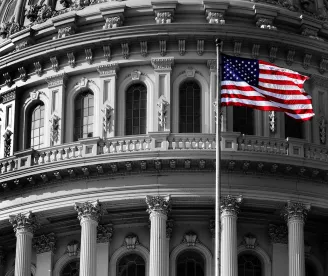The US Congress has returned to Washington, DC, and bipartisan negotiations to produce the next significant federal coronavirus response legislation have officially begun. Treasury Secretary Steven Mnuchin and White House Chief of Staff Mark Meadows, representing President Donald Trump, are scheduled to meet this afternoon on Capitol Hill with House Speaker Nancy Pelosi (D-CA) and Senate Minority Leader Chuck Schumer (D-NY), after visiting with Senate Majority Leader Mitch McConnell (R-KY) and Senate Republicans earlier in the day. House Minority Leader Kevin McCarthy (R-CA) has been in close contact with the White House and McConnell as well. While all “five corners” involved in the talks have wildly varying priorities for the high-stakes negotiations, all share the same ultimate objective: enactment by early August of a bipartisan COVID-19 relief measure of US$1 trillion or more to support the nation’s economy as it struggles to regain its footing in the midst of the global pandemic.
Topics covered today include: federal budget and appropriations, tax and economic development, health, government oversight and investigations, and US states developments.
Publication note: Following a modified schedule, the next briefing will be published on July 23, 2020.
Pelosi and Schumer issued their opening bid in the coronavirus relief package talks back in May with House passage of the US$3.5 trillion HEROES Act, a sprawling measure featuring generous new funding for states, territories and local governments, extended unemployment benefits and a range of other components favored by Democrats. The Republican-led Senate is finally preparing to counter with its own proposal, but the GOP first will have to settle some internal disputes, beginning with the lukewarm response to President Trump’s desire for a bill that includes a reduction in payroll taxes. POLITICO has more:
[B]efore the two sides can come together, there has to be consensus in each party — and right now, Senate Republicans aren’t on the same page with the White House, which is complicating efforts to craft the next coronavirus relief bill. There are internal GOP divisions over everything from whether to include a payroll tax cut, how much money to include for testing and whether to link school money to reopening.
So, in other words: this is going to be a slog. Even Sen. John Thune (R-SD) suggested that there could be multiple drafts of the GOP bill, including an initial proposal to appease the president. ‘His advocates – Mnuchin and Meadows and others – I think will probably try and ensure that it’s at least included in the first draft,’ Thune told reporters, referring to the payroll tax cut. . .
In another break with the president, Senate Republicans also want billions more to support state testing efforts. They also are pushing for funds for personal protective equipment and to lay the groundwork for vaccine production.”
The bipartisan negotiations will unfold in the days ahead as Congress simultaneously works on other legislative priorities, including the National Defense Authorization Act and a series of annual appropriations bills to fund federal operations for the upcoming fiscal year. Congress will also mark the passing of former US Representative and civil rights hero John Lewis (D-GA), who died late last week after a struggle with pancreatic cancer. The House began proceedings Monday with a moment of silence in tribute to Lewis, a somber start to what will be a highly consequential legislative stretch for policymakers on both sides of the political aisle in Washington, DC.
Appropriations Updates
The House Appropriations Committee resumes its month-long legislative sprint this week with the consideration of the first in a series of must-pass spending packages providing funding and shaping policy for the US government for fiscal year 2021. Following two weeks of Committee deliberations, the full House will turn its attention to passing funding legislation and setting the stage for future negotiations with the Senate and White House.
The House will consider later this week H.R. 7608, a US$259.5 billion funding proposal that combines four of the 12 individual spending measures – State and Foreign Operations, Agriculture, Interior and Environment, and Military Construction/Veterans Affairs – into a single legislative package. Each bill, or division, will be debated and amended separately beginning Thursday, with a final vote anticipated on the comprehensive four-bill “mini-bus” on Friday.
Next week, the House will consider H.R. 7617, a US$1.367 trillion funding proposal that combines seven of the eight remaining fiscal year 2021 spending bills – Defense, Commerce-Justice-Science, Energy and Water Development, Financial Service and General Government, Homeland Security, Labor-Health and Human Services (HHS)-Education, and Transportation-Housing and Urban Development – prior to Members departing for the August congressional recess.
In preparation for this legislative marathon, the House Rules Committee will determine the parameters for floor debate, including the universe of amendments to be considered by the House. The House Rules Committee is one of the most powerful legislative panels in Congress; its chairman is a trusted lieutenant of the majority leadership, selected by the Speaker of the House. Amendments to appropriations measures fall into two general categories: 1) transfer amendments that shift dollars between agencies and accounts within an individual bill to increase or decrease available funds for a specific activity or priority; and 2) limitation amendments that prohibit the use of funds in a specific funding bill for a specific agency action.
Traditionally, appropriations measures are considered under an open rule amendment process, which provides unfettered debate and the opportunity for members of any party affiliation to offer amendments germane to a particular bill. The open rule amendment process is described by Squire Patton Boggs’ Senior Strategic Advisor and former House Speaker John Boehner here. Under the terms of debate likely to be approved by the Rules Committee, however, the four-bill and seven-bill spending proposals are expected to be considered under a modified closed rule – commonly known as a structured rule – which provides general debate for a specified period of time but limits the offering of amendments only to those that are determined by the Rules Committee. Structured rules have become customary on appropriations bills under the leadership of both political parties in recent years in an attempt to filter out disruptive floor amendments, and prevent legislative mischief from derailing must-pass bills.
The Rules Committee established a Monday (July 20), 1:00 p.m. deadline for Members to submit amendments to H.R. 7608 – State, Foreign Operations, Agriculture, Rural Development, Interior, Environment, Military Construction, and Veterans Affairs Appropriations Act. Historically, such deadlines have been arbitrary in nature, and amendments have been submitted to the Rules Committee for consideration up until the point the Committee meets to address specific legislation.
While the Appropriations Committee is traditionally among the most bipartisan committees in Congress, the appropriations process thus far has generally been a partisan affair, with Committee Republicans largely sidelined in the process of drafting spending bills. Citing spending levels that exceed the statutory budget caps established last year through the Bipartisan Budget Act of 2019 (Public Law 116-37), House Republicans are voicing strong objections to the inclusion of more than US$245 billion in emergency spending within fiscal year 2021 bills to address Democratic priorities related to the COVID-19 pandemic. Concerns are also being raised over dozens of policy provisions opposed by the Republican-led Senate and President Trump.
Given the House GOP’s limited ability as the minority party to alter the debate at this stage of the process, funding bills are expected to pass through the lower chamber largely on party-line votes. While passage of 11 of 12 spending measures will mark the culmination of the House’s work on spending bills this budget cycle, this progress signals only the first step in a much longer legislative process that has yet to include the GOP-controlled Senate. Many of the issues at the center of the current House debate will emerge once again down the road, and will be at the forefront of bipartisan, bicameral negotiations over final fiscal year 2021 spending bills.
Tax and Economic Development Updates
Last Friday, the Federal Reserve announced modifications to its Main Street Lending Program (MSLP) in order to “provide greater access to credit for nonprofit organizations such as educational institutions, hospitals, and social service organizations.” Pursuant to the term sheets for the two new nonprofit loan options (new and expanded), the Federal Reserve is: (1) lowering the minimum employment threshold from 50 employees to 10 employees; (2) easing the limit on donation-based funding; and (3) adjusting several financial eligibility criteria to accommodate a wider range of nonprofit operating models. Each loan applicant must be tax-exempt pursuant to section 501(c)(3) or 501(c)(19) of the Internal Revenue Code. Generally, the MSLP nonprofit loan terms reflect the MSLP for-profit business loans, including the interest rate, principal and interest payment deferral, five-year term, and minimum and maximum loan sizes.
That same day, Treasury Secretary Steven Mnuchin and Small Business Administration (SBA) Administrator Jovita Carranza testified before the House Committee on Small Business to discuss ongoing federal assistance for US small businesses, including implementation of the Paycheck Protection Program (PPP). Notably, during his testimony, Secretary Mnuchin made clear that, generally, he is supportive of automatic PPP loan forgiveness with “some fraud protection.” While the Treasury Secretary did not specifically discuss a threshold under which loans should qualify for automatic loan forgiveness, legislation in the Senate – which is supported by Senate Committee on Banking Chairman Mike Crapo (R-ID) – would automatically forgive PPP loans under US$150,000, which amounts to approximately 80% of loans offered through the program. To that end, it was suggested that SBA’s online portal through which banks can apply for loan forgiveness on behalf of clients should be operational by August (the program is currently set to expire on August 8) and will include “a very robust process to review loans before loans are forgiven,” according to Secretary Mnuchin. Looking ahead, Secretary Mnuchin also expressed support for making further changes to the program to incentivize additional borrowers to take advantage of the small business lending program in conjunction with appropriating additional funding targeted to “businesses that have significant revenue declines.”
As policymakers continue implementing and looking to further refine aspects of the CARES Act, Congress is also continuing to debate the parameters of the next COVID-19 relief package. One issue that remains at the center of debate: how to address the US$600 per week expanded unemployment benefits set to expire at the end of July. While it remains unclear exactly how lawmakers will proceed, it seems a likely compromise may include an extension that decreases the maximum weekly benefit. Moreover, as Bloomberg is reporting, “House Ways and Means Committee Republicans last week released two bills meant to help Americans return to work:
- A measure from Rep. Tom Rice (R-SC) would provide a refundable tax credit against payroll taxes for half the cost businesses incur for COVID-19 testing, personal protective equipment, and extra cleaning.
- A bill from Rep. David Schweikert (R-AZ) would give businesses a refundable payroll tax credit based on their average number of employees and cover half of the cost of Covid-19 testing for companies.”
Secretary Mnuchin is also continuing to promote the need for a “technical fix” for unemployment insurance meant to address those instances in which workers receive more income through weekly benefits than they did while employed in their job. That said, whatever approach lawmakers ultimately agree to, it is clear that they will be under pressure to avoid allowing unemployment benefits to lapse, something that former Federal Reserve Chair Janet Yellen testified last week would be a “catastrophe” for economic recovery.
Other items under discussion for the forthcoming legislation:
- Additional aid for state and local governments, including a proposal by Senate Democrats that would provide US$350 billion for minority communities;
- A payroll tax cut (which the White House has indicated “must be part of any phase four package”) and other tax incentives, such as tax credits for businesses that purchase personal protective equipment and rehire employees;
- Federal assistance targeted at certain industries (restaurants, tourism, and even potential additional relief for airlines); and
- Additional economic impact payments for certain individual taxpayers
A few other tax and economic development updates of note from Politico:
- The House [yesterday] approved an amendment that would require companies to report ownership information to the Treasury Department, a measure that advocates say will help combat financial crimes like money laundering.
- The Office of the Comptroller of the Currency on Monday proposed loosening restrictions on loans made in partnership with other firms like online lenders, raising alarms with consumer groups.
- The [Federal Deposit Insurance Corporation] on Monday asked for input on whether it should create a public-private partnership to set standards for financial technology, part of an effort to help community banks save money on regulatory compliance as they look to partner with tech firms or take innovative approaches themselves. In a request for information, which is not yet a formal proposal, the agency suggested that such an effort could also be used voluntarily to allow banks to get a certification that outside firms, or “third party vendors,” pass regulatory muster. It also asks how such a body might be funded.
Finally, note that today, former Vice President Joe Biden is set to detail the “third plank” of his economic plan, which is focused on the “caring economy” (i.e., child and elderly care). In Thursday’s report, we will provide additional details on this US$750 billion proposal that would be funded through taxes on real estate investment and increased tax compliance for high-income earners making more than US$400,000 per year.
Health Updates
Today, the House Committee on Energy and Commerce Subcommittee on Oversight and Investigations is holding a hearing with five executives of drug companies that are currently working to develop a vaccine against COVID-19. The witnesses include Mene Pangalos of AstraZeneca; Macaya Douoguih of Janssen Vaccines; Julie Gerberding of Merck; Stephen Hoge of Moderna; and John Young of Pfizer. Each company is involved in the administration’s “Operation Warp Speed” project. The witnesses are expected to field questions about the federal government’s investment in the process and how the vaccines will be priced and distributed. Democrats on the Subcommittee are also likely to raise concerns about political pressures on a rush to advance a vaccine without first ensuring their safety and effectiveness.
On Monday, Chairman of the Senate Health, Education, Labor and Pensions Committee Lamar Alexander (R-TN) released a white paper titled, “Preparing for the Next Pandemic Act,” which focuses on vaccine development and sufficient stockpiling. According to the Chairman’s summary, the bill would provide US$5 billion over 10 years to maintain sufficient onshore manufacturing for tests, treatments and vaccines; authorize US$10 billion over 10 years for states so that they can create and maintain their own stockpiles of supplies such as masks and ventilators; and improve the federal Strategic National Stockpile by allowing the Federal government to work with companies to maintain additional supplies and manufacturing capacity.
As the popularity of telehealth continues to grow, Congress and the Trump Administration are beginning to lay out proposals to make permanent payment and regulatory flexibilities established during the public health crisis. In a blog post for the journal Health Affairs published on July 15, Centers for Medicare and Medicaid Services (CMS) Administrator Seema Verma declared, “in light of our new experience with telehealth during this pandemic, CMS is reviewing the temporary changes we made and assessing which of these flexibilities should be made permanent through regulatory action. As part of our review, we are looking at the impact these changes have had on access to care, health outcomes, Medicare spending, and impact on the health care delivery system itself.” On Monday, a flurry of legislative proposals were released. Senator Deb Fischer (R-NE) and Senator Jacky Rosen (D-NV) introduced the “KEEP Telehealth Options Act,” which would require the Secretary of HHS to study and produce a public report on the actions taken to expand access to telehealth services during the COVID-19 pandemic under the Medicare, Medicaid, and CHIP program. Senator Ron Wyden (D-OR), the Ranking Member of the Senate Committee on Finance, introduced the “Telehealth Expansion Act of 2020,” which would remove the statutory geographic restrictions and expand the available originating sites for mental telehealth services. Finally, the House Ways and Means Committee Republicans published a discussion draft titled “Keeping Medicare Patients’ Improved Access to Care through Telehealth.” The proposed provisions include removing the originating site requirement; permanently lifting restrictions on Federally Qualified Health Centers and Rural Health Clinics, which will allow them to continue to be reimbursed for telehealth services provided to Medicare beneficiaries; and permanently allowing certain clinical practitioners, such as physical therapists, speech pathologists, and occupational therapists, to provide telehealth services. The proposal would also give the Secretary of HHS the authority to waive limitations on other types of clinical practitioners.
On Friday, HHS announced the distribution of an additional US$10 billion in payments to hospitals in high-impact COVID-19 areas. The second round of funding focused on so-called “hot-spots” was based on a formula for hospitals with over 161 COVID-19 admissions between January 1 and June 10, 2020, or one admission per day, or that experienced a disproportionate intensity of COVID-19 admissions (exceeding the average ratio of COVID-19 admissions/bed). Hospitals will be paid US$50,000 per eligible admission. The announcement was met with praise by some, such as House Energy and Commerce Committee Chairman Frank Pallone (D-NJ), who stated, “this is welcome news and I’m relieved that additional funding assistance is on the way to the hospitals and health care workers that have been on the frontlines of this crisis for the past six months.” However, groups like the American Hospital Association are concerned the payments will exclude hospitals in new hot spots emerging in Florida, Georgia, Arizona and Texas because of the cut-off date. HHS has indicated there is a possibility of further funding of this nature in the future as data evolves. Detailed information on the recipients can be found here.
Oversight Updates
Yesterday, the Congressional Oversight Commission – one of the bodies established by the CARES Act to oversee implementation of the law – issued its third report. In it, the Commission described recent key actions the Treasury Department and the Federal Reserve had taken under Subtitle A of the CARES Act, which provided US$500 billion to Treasury for lending and other investments, including more than US$30 billion for the aircraft sector, airlines and other businesses essential to national defense. In the context of emergency lending to essential national security firms, the Commission drew attention to YRC Worldwide Inc., a shipping firm that received a US$700-million loan earlier this month. Pointing out that YRC qualified for the program solely on a recommendation and certification from the Secretary of Defense or the Director of National Intelligence, the Commission “has questions about the decision to deem YRC a business critical to maintaining national security and the process for reaching that conclusion.” Now issuing its third report, the Commission remains without a chair. The current members are Bharat Ramamurti, former aide to Senator Warren; Senator Pat Toomey (R-PA); Representative Donna Shalala (D-FL); and Representative French Hill (R-AR).
Last Friday, Representatives Carolyn Maloney (D-NY), Chairwoman of the House Oversight and Reform Committee; James Clyburn (D-SC), Chairman of the Select Subcommittee on the Coronavirus Crisis; and Raja Krishnamoorthi (D-IL), Chairman of the Subcommittee on Economic and Consumer Policy, sent a letter to HHS Secretary Alex Azar and Centers for Disease Control and Prevention (CDC) Director Robert Redfield, calling on the administration to reverse its decision to divert coronavirus data away from the CDC and instead report it to a private contractor, TeleTracking Technologies. They urged HHS and the CDC “to reverse this decision, restore this data collection role to the CDC, and take all necessary steps to ensure that essential data is collected and publicly reported free from political interference.” The lawmakers also sought information on why TeleTracking was awarded a sole source contract and how data reported through this new platform will differ from that previously reported to the CDC.
Also last Friday, Senator Elizabeth Warren (D-MA) and three other senators wrote a letter to CDC Director Redfield and CMS Administrator Verma urging them to begin collecting and publicly releasing demographic data on residents and workers at nursing homes who are diagnosed with COVID-19. Pointing out that “all evidence indicates that people of color have disproportionately borne” the impact of the pandemic, the lawmakers stressed the importance of expanding data collection to include race, ethnicity, sex, age, primary language and disability status.
Last week, Senator Warren and five other senators criticized the Trump Administration for acquiring its supply of remdesivir, an antiviral drug used to reduce recovery time for COVID-19 patients, at a much higher price than other countries pay, by allowing Gilead Sciences, the drug’s manufacturer, to charge US purchasers a price that is “more than 350 times the price necessary to produce and profit from the drug.” The lawmakers asked HHS to explain “why President Trump—or whichever Administration officials were responsible—would strike such an expensive deal, and what steps the Administration is taking to ensure sufficient supply of the drug.”
State Updates
Governors Asa Hutchinson of Arkansas (R), Jared Polis of Colorado (D) Kay Ivey of Alabama (R) and Steve Bullock of Montana (D) last week added their state’s names to the growing list across the country of states (more than half) requiring mask wearing or face coverings.
President Trump, who has publicly downplayed the importance of face coverings, called mask-wearing “patriotic” in a tweet on Monday as more states have mandated face masks due to significant increases in coronavirus infections, hospitalizations and deaths across the country over the last several weeks. The president first wore a mask publicly on July 11 during a visit to a military hospital. The tweet yesterday included a photo from a visit to Walter Reed National Military Medical Center and has represented the president’s most public endorsement yet of the use of masks during the pandemic.
While several grocery and retail outlets have adopted mask wearing in their stores, the National Retail Federation has also encouraged retailers to set nationwide mask policies to protect shoppers and employees. One grocery chain, Winn-Dixie, with close to 500 stores in five states that supported the president in 2016, (Alabama, Florida, Georgia, Louisiana and Mississippi) even shifted gears on mask wearing late Monday. Its parent company Southeastern Grocers announced it would start requiring masks in its stores beginning on July 27, after it had initially said it was not considering mandatory mask wearing out of concern for tensions between employees and customers. The outlet said it changed its mind because of customer feedback, not the president’s earlier tweet.
In an interview yesterday with the Journal of the American Medical Association’s Dr. Howard Bauchner, CDC Director Redfield said the time to wear a mask is now. “If we could get everybody to wear a mask right now I think in four, six, eight weeks we could bring this epidemic under control.”
This pst was features contributions from Meg Gilley and Genevieve Bresnahan.







 />i
/>i
